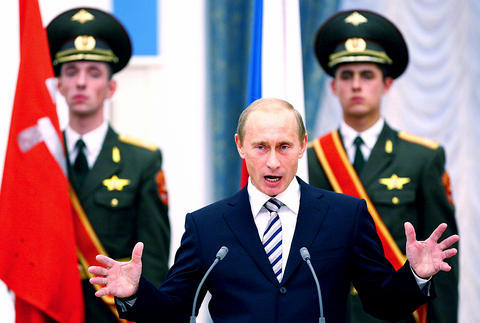Europe has lost the plot in trying to cope with a resurgent Russia under President Vladimir Putin, who is dictating the agenda in his dealings with European capitals, according to a study published on Wednesday.
The West's post-Cold War policy of promoting democracy and Westernization in Russia has failed.
"That strategy is now in tatters," said the 65-page report from the European Council on Foreign Relations. "Today it is Moscow that sets the pace for EU-Russia relations. Russia [is] more powerful, less cooperative, and more intransigent. Russia's growing confidence has transformed the EU-Russia relationship."

PHOTO: AP
As Moscow turns its back on the West and wields its UN security council veto to stymie Western policy while holding Europe as its energy hostage, Brussels is flailing incoherently, the report found.
"Today it is the Kremlin that sets the agenda for EU-Russia relations," said Joschka Fischer, the former German foreign minister, who jointly chairs the council, an independent thinktank.
The EU's economy is 15 times the size of Russia's and its population three times that of its neighbor, but Brussels finds itself consistently outwitted, the report said.
The challenge posed by Putin has come into sharp focus this year. He is blocking a European plan to take control of the southern Balkan province of Kosovo and steer it to independence. Every time he has come to Western Europe recently, Putin has stolen the show with belligerent performances. In February in Munich he accused US President George W. Bush of trying to take over the world. Two weeks ago in Lisbon, he used an EU-Russia summit to warn of a replay of the Cuban missile crisis of 1962 if the US sited parts of its missile shield in Poland and the Czech Republic.
Putin has gained the upper hand by a policy of divide and rule with the Europeans, bypassing Brussels, dealing with individual countries, and exploiting rifts between EU states.

In the sweltering streets of Jakarta, buskers carry towering, hollow puppets and pass around a bucket for donations. Now, they fear becoming outlaws. City authorities said they would crack down on use of the sacred ondel-ondel puppets, which can stand as tall as a truck, and they are drafting legislation to remove what they view as a street nuisance. Performances featuring the puppets — originally used by Jakarta’s Betawi people to ward off evil spirits — would be allowed only at set events. The ban could leave many ondel-ondel buskers in Jakarta jobless. “I am confused and anxious. I fear getting raided or even

POLITICAL PATRIARCHS: Recent clashes between Thailand and Cambodia are driven by an escalating feud between rival political families, analysts say The dispute over Thailand and Cambodia’s contested border, which dates back more than a century to disagreements over colonial-era maps, has broken into conflict before. However, the most recent clashes, which erupted on Thursday, have been fueled by another factor: a bitter feud between two powerful political patriarchs. Cambodian Senate President and former prime minister Hun Sen, 72, and former Thai prime minister Thaksin Shinawatra, 76, were once such close friends that they reportedly called one another brothers. Hun Sen has, over the years, supported Thaksin’s family during their long-running power struggle with Thailand’s military. Thaksin and his sister Yingluck stayed

Kemal Ozdemir looked up at the bare peaks of Mount Cilo in Turkey’s Kurdish majority southeast. “There were glaciers 10 years ago,” he recalled under a cloudless sky. A mountain guide for 15 years, Ozdemir then turned toward the torrent carrying dozens of blocks of ice below a slope covered with grass and rocks — a sign of glacier loss being exacerbated by global warming. “You can see that there are quite a few pieces of glacier in the water right now ... the reason why the waterfalls flow lushly actually shows us how fast the ice is melting,” he said.

RESTRUCTURE: Myanmar’s military has ended emergency rule and announced plans for elections in December, but critics said the move aims to entrench junta control Myanmar’s military government announced on Thursday that it was ending the state of emergency declared after it seized power in 2021 and would restructure administrative bodies to prepare for the new election at the end of the year. However, the polls planned for an unspecified date in December face serious obstacles, including a civil war raging over most of the country and pledges by opponents of the military rule to derail the election because they believe it can be neither free nor fair. Under the restructuring, Myanmar’s junta chief Min Aung Hlaing is giving up two posts, but would stay at the